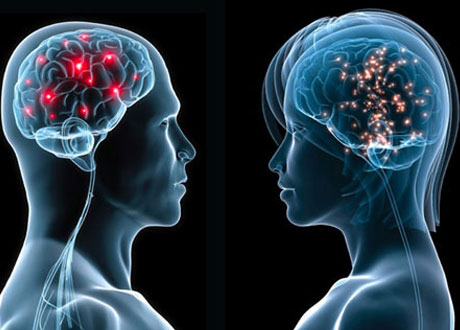Brain On Sex: How The Brain Functions During Sex
The act of having sex or making love is a very complicated exercise. It is far from the simple physical act of merging sexual organs together. The sexual practice has actually to involve some emotional feeling from both individuals doing the act. For these emotional feelings from both the couple to work together in unison, there would be need for some body coordination. This coordination of the bodies of those in the act of having sex is done by the brains of both the couple. The brain has some chemicals that aid in this type of coordination. When both couples are in the mood for sex, the brain sends a communication to the receptors that are responsible and these chemicals are released as a result; dopamine, norepinephrine, prolactin, oxytocin and vasopressin, endorphins, serotonin, phenylethylamine, and testosterone.

When a couple is about to engage in a sexual act, their bodies experience some sexual feeling and excitement. Both their brains respond by releasing the neurotransmitter dopamine, which is released by the part of the brain called ventral striatum. This is the part of the brain is wired in such a way that it is essentially the reward sensing system part of the brain, which acts as the pathway to experiencing pleasure. So when the couple starts to get intimate or start doing things that are slightly sexual in nature, as kissing and touching intimately, dopamine surge within their brains increases. This causes a lot of pleasure anticipation for the couple that they completely have no control over. The desire drives them crazy, and being that their brains probably know what they should do; sexual intercourse becomes an involuntary act. And this is how their bodies get used to responding each time they come into contact with each other in some sexually suggestive way.
Working closely with dopamine is the phenylethylamine. This chemical is produced by the brain in response to the sexual desire of the body. When a couple feels sexually attracted to each other, phenylethylamine is released in the brain. This hormone causes sexual attraction between the couple in addition to the feeling of excitement. It is also the hormone that triggers the production of dopamine. Its production occurs during sex and peaks at orgasm.
Before getting to the actual sexual act, the bodies and brains of both the couple need to be put at ease and ready for sex. At this stage, the brains respond by producing norepinephrine hormone. This hormone is responsible for making the body ready for sexual intercourse. It creates some sense of focus and alertness to the brains as it communicates to them what is coming. This focus on the brain is needed for the act of making love to be satisfactory to both couples. This is because sex goes beyond just the physical aspect of it. The feelings need to be internalized and processed from the inside too.

Next in line of hormonal production on the brain during sexual intercourse are the oxytocin and vasopressin. These two hormones are for bonding. They assist the brains of the couple commit to bonding between their bodies. This it does by laying down a long-term memory for the brain cells. What normally happens during sex is that, the oxytocin hormone triggers or stimulates the prostate, which in turn causes the muscles of the body to contract, thereby causing sensitization of the nerves. This leads to the climax, hence the sexual orgasm. At which point the bodies of the couple experience the bonding as those their bodies were one.
Endorphins is another brain hormonal is released by the body during sex. It is formed within the body that binds to the opiates receptor sites in the brain. The hormone that that calming effect on the body by creating the sense of well-being and relaxation during sex. It also causes high wave of pleasure during sex.
The ultimate climax of making love or having sex is the orgasm. When a couple achieves orgasm during sex, there is the blissful feeling of pleasure that comes from deep down the bond created by orgasm. At the same time, a hormone called serotonin is released. Serotonin makes the body relax and calms down after having sex. The good feeling of sex is, and the good aftermath feeling is caused by this hormone. Then finally, there is the hormone called the prolactin. This hormone disengages the brain off the orgasm feeling. It clears off the orgasm arousal hence shifting the concentration of the mind off sex.








